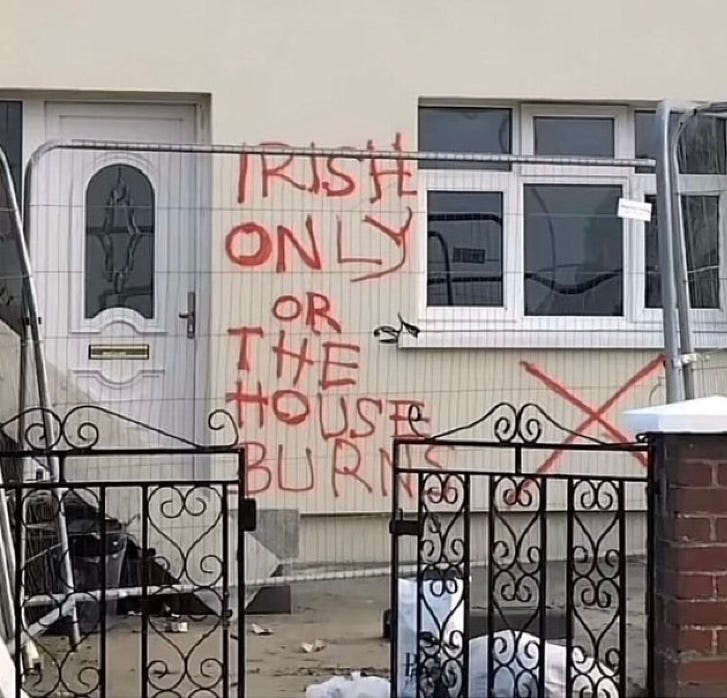The Crisis Has Not Yet Begun
What we are experiencing are the tremors, not the earthquake
Like most Dubliners I live amongst people who arrived here as immigrants who have become friends, casual acquaintances, colleagues, in some cases the spouses of family members. Like most people I have friends, family and acquaintances who have made lives in other countries where I hope they are safe, happy and welcome. So how should we feel when we see an image of a refurbished council house in Finglas on social media bearing the spray painted message “IRISH ONLY OR THE HOUSE BURNS”, as we did this week?
Even a hardened immigration skeptic would admit that it’s better to live in a country where this stuff doesn’t happen than where it does. Perhaps taking a long view would make one feel better? After all, negative feeling about immigration will inevitably find some expression in the political system; at least the twin crises of asylum and housing have forced us to, as politicians have become so fond of saying, start “having a national converstaion” on the topic - that being the prerequisite of finding some kind of resolution on it. Maybe we can take comfort that the long-delayed reckoning is happening and an end is in sight? Unfortunately, that would be a mistake. The dreadful truth is that what we are currently experiencing are the tremors, not the earthquake; not only are we not “talking about it” but even haven’t begun to contemplate what will happen when the true crisis hits.
We see this in all parts of the system. When footage drips through of a town hall in some remote part of Ireland where the citizens have gathered to discuss the imminent doubling of the town’s population, the concerns voiced are always around practical matters, and often accompanied by pained denials of racism. “Now I don’t mind any kind of person moving in here, we welcome all sorts but, we have no Garda Station. We have only one GP. There aren’t enough places in the local school.” These are often couched in terms of resources that have been promised or requested for a long time.
In the case of mainstream politicians, commentary on the management of immigration is purely at the level of administration around housing and asylum claims. For activists, the driver of our current crisis has always been the failure of the government to provide sufficient housing - talk of an immigration crisis is a distraction at best or an elite polt at worst, to conceal either the incompetence of the government to deal with our housing requirements or a refusal to do so because landlords are making too much money. Regardless of your feelings about activism there is of course a lot to this argument.
In other words everyone at every level - including the public - is happy to pretend that if immigration poses a political problem it’s at the level of asylum; that the crux of the crisis is the lack of public resources; and that if we can simply untie the knot of those two issues the crisis will go away or at least calm down to a manageable level. The logical conclusion of that is that if the population of Dublin increased by 50% tomorrow, with 100% of that increase being a country with no historic connection or cultural similarity to Ireland, that would present no political difficulty beyond the capacity of social services to cope with the change.


